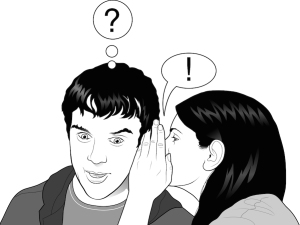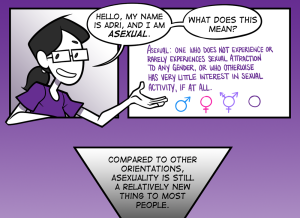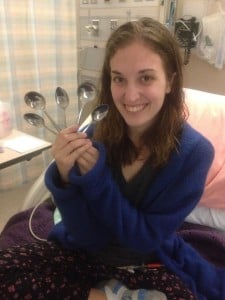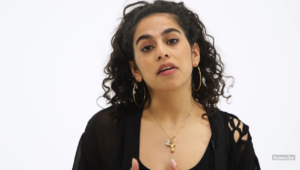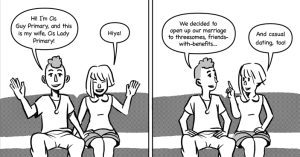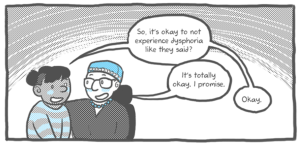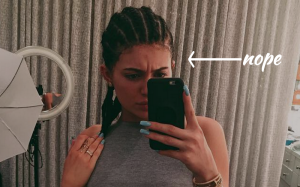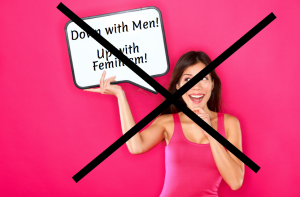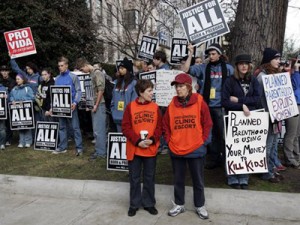
Source: How Stuff Works
Outside of the abortion clinic, we stand quietly in bright orange vests that read Pro-Choice Escort.
We’re here on rainy days, in the blistering heat, and even in the snow – surrounded by people who are pacing, praying, chanting, yelling.
Passersby walk along the sidewalk past the clinic, sometimes glancing over, nodding, and occasionally thanking us. But more often, people just walk on by, not seeing – or maybe refusing to see.
We stand there waiting for patients, ready.
When a woman walks down the street and her eyes find the Planned Parenthood sign, we know she’s coming in.
We set ourselves up in position, ready to walk alongside her for the brief walk from the sidewalk to the door.
The pathway is short. It probably takes less than a minute to cross. But for that minute, time slows as we make our priority getting that patient in through the clinic doors with as little commotion (and emotional trauma) as possible.
We are at the clinic because they are – the anti-abortion protestors, or antis: the verbally abusive, holier-than-thou, verging-on-violent anti-choice activists who post themselves outside of our local abortion clinic.
They pray on their knees just outside of the door, they follow patients to the door, begging them to take their brochure, to stop and talk to them. They know what’s best, the antis say.
And they’re everywhere – at clinics all over the country.
Due to varying laws regarding public space, some are limited to protesting on the sidewalk or in parking lots, while others are allowed to protest as close as the clinic doors.
For a patient, getting into a clinic with anti-abortion protesters can be a total nightmare.
Walking in, patients are bombarded by rosaries, poster-sized photo-shopped images of fetuses, people praying aloud while others yell “Don’t murder your child!”
The tactics vary based on who is in attendance, but the intent is the same: to keep people from exercising their legal right to abortions.
At our clinic, an elderly man with remarkable energy for his age shows up week after week with rosaries and brochures detailing the supposedly violent nature of a procedure he obviously knows nothing about.
He knows the times of day when abortions are provided, and he shows up bright and early on those days, ready to harass anyone walking in.
He has his spiel: that Planned Parenthood wants to murder their child, that they should come with him instead, that he can help them.
Handing them his brochure and a rosary, he follows them after their appointment, often for several blocks.
Patients tell him to leave them alone, but he refuses to listen. He targets Women of Color, his rage doubling as he goes after them.
There are others, too – students from the nearby Catholic University who show up and follow women up to the door, walking alongside them and screaming at them, sometimes physically blocking their way in to the clinic and often harassing, even threatening, the escorts.
An elderly woman always stands next to the door with a “Smile, Your Mother Chose Life” sign and a totally inaccurate image of a fetus while loudly proclaiming in a condescending tone “God loves you” to everyone who walks in.
And then there we are: the volunteer escorts.
We’re just trying to get the patients safely to the door, which often requires us to physically block the protesters who are shoving things in front of patients.
We have to move around gracefully, keeping protesters away from the patients without actually touching them – antis tend to be very willing to sue escorts for assault, even if they’re the ones bumping into us.
To experience these protesters as an escort, day after day, it can begin to look like street theatre.
We’re all in this dance, this performance, or maybe some kind of sport, where the goal of one team is to keep the person from getting to the door, while the other team’s goal is to get that person safely to the door.
It can be just so ridiculous, and often I leave a shift in tears, because I see the pain that these protesters have caused, the confusion and the vulnerability, and I want to make it all go away.
To experience these protesters as a patient can be confusing.
Often, patients are just trying to get through the day, with their minds on the procedure they’re about to undergo, and maybe on their relationships, their financial situations, their jobs.
You probably aren’t used to strangers sidling up right alongside you, getting too close for comfort as they attempt to convince you that a decision you have made is wrong, as if they know your life better than you know it yourself.
So because they’re probably not expecting it, patients often stop, assuming these strangers have good intentions, take the brochure, and sometimes get caught up in a conversation in which they find themselves having to defend their decision to obtain a legal medical procedure.
To experience these protesters as a patient can be traumatic.
Not everyone has a hard time making the decision to have an abortion.
But some do.
And it can be a difficult experience, thanks in large part to the societal shame and stigma and lack of community support around abortion.
So when old, white men and young people jump out and shout at you as you walk from your car to the door of the abortion clinic, telling you that your decision is wrong and that you’re a bad person, it can be the absolute last thing you need at that moment, a moment you more likely need support and love.
I remember all too well when I had an abortion, many years ago, and I was driving out of the clinic parking lot, having completed the procedure and feeling totally relieved.
At that moment, I caught sight of a protester.
Just one middle-aged white dude, with a sign saying something along the lines of “ABORTION IS MURDER,” and at that, I just broke down.
The audacity of this man to tell me this, to tell me what to do with my body, and to act as if he had any idea what my life experience was.
I felt vulnerable, and it was so painful, making me feel like the world was against me.
It was soon after that I began escorting at the local abortion clinic, hoping to make it a little better for women in similar positions.
If these people are standing outside of clinics telling women their choices are wrong, how do we affirm women’s choices and show support?
Clinic escorts can only do so much.
We don’t have time to have long conversations with patients, and we’re not there to find out anything about them.
We’re just trying to mitigate the painful interactions.
We’ve noticed, too, that when we’re out there, the antis are less likely to get rowdy.
Yes, they continue their harassment, but they’re being watched, and they know that. We’ll call security when protestors assault a patient or attempt to block the entrance.
The Freedom of Access to Clinic Entrances (FACE) Act, which forbids anyone from using “force, threat of force, or physical obstruction” from providing or receiving reproductive health services, was signed into law in 1994.
The previous year, anti-abortion extremists had shot and killed an abortion doctor, along with committing twelve arsons, one bombing, and 66 blockades at abortion clinics around the country – in just one year.
And while the FACE law has been helpful in curbing some of these blockades, many escorts have seen illegal actions carried out by anti-abortion protestors go unpunished.
And we continue to see clinic harassment and violence, particularly against abortion providers.
The Supreme Court is also currently looking at overturning buffer zones outside of abortion clinics.
We need clinic escorts now more than ever.
Consider getting involved in clinic escorting or clinic defense.
Most groups are always in need of volunteers, and many clinics all over the country have volunteer escort programs. You can contact your local abortion clinic to find out if they have one. And if they don’t, ask if you can start one.
Although it can be painful and frustrating to see the way that protestors treat others, being a clinic escort can be an incredibly rewarding experience.
Often it’s more satisfying than the (also necessary) work of rallying and lobbying for greater reproductive health access, because you see the difference that you’re making.
You see what people are capable of and you know that your actions – your mere presence – have made someone’s abortion experience a little bit better.
And that makes all the difference.
Want to discuss this further? Login to our online forum and start a post! If you’re not already registered as a forum user, please register first here.
Laura Kacere is a Contributing Writer for Everyday Feminism and is an feminist activist, social justice organizer, clinic escort, and yogi living in Washington, D.C. Laura coordinates the Washington Area Clinic Defense Task Force, teaches yoga with the intent of making it accessible to all, and does outreach for the DC-based sex worker support organization, HIPS. When she isn’t on her mat or at the clinic, she’s usually thinking about zombies, playing violin, eating Lebanese food, and wishing she had a cat. Follow her on Twitter @Feminist_Oryx. Read her articles here.
Search our 3000+ articles!
Read our articles about:
Our online racial justice training
Used by hundreds of universities, non-profits, and businesses.
Click to learn more






